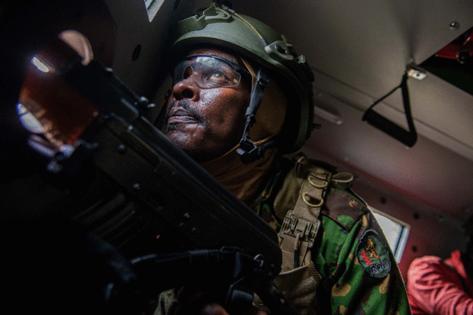United Nations imposes sanctions on more gangs in Haiti amid growing violence
Published in News & Features
Haiti’s most powerful gang coalition and another criminal armed group operating in the country’s breadbasket have been added to a United Nations global sanctions list.
The Viv Ansanm coalition and Gran Grif join other gang members sanctioned by the U.N. Security Council. The listing follows the Trump administration’s decision in May to designate both groups as foreign and global terrorists.
The criminal armed groups are behind the deaths of more than 2,000 people this year who have been killed in gang-related violence, and the destruction and seizing of property in the west region, which encompasses Port-au-Prince, and the Artibonite region as well as parts of the Central Plateau.
The two criminal groups bring the U.N. sanctions’ list to nine. All are gang leaders or organizations, with the exception of Prophane Victor, a former member of the country’s Lower Chamber of Deputies who was arrested earlier this year and remains in police custody. As a result of the listing, individuals are subject to assets freezes, arms embargoes and travel bans.
In its rationale for the listing, the U.N. sanctions committee said Gran Grif was listed due to its many atrocities, including dismembering a man after he resisted gang members’ assaults. The largest gang in Haiti’s Artibonite region, Gran Grif has been responsible for 80% of civilian deaths in the agricultural region.
Between December 2023 and July 2024, the Gran Grif gang kidnapped 157 people in nine kidnapping incidents in the Petite-Rivière-de-l’Artibonite. On Nov. 30, 2024, a 22-year-old woman was killed with two shots to her genitals after refusing to have sexual relations with Gran Grif gang leader Luckson Elan, the U.N. said.
The U.N. said the killing of two lawyers in April and May 2024 by the gang were aimed “to create a climate of fear and intimidation and constitute serious threats to the exercise of judicial independence and legal representation.”
The gang has also attacked the Haitian national police and the Kenya-led security mission, including a February 2025 attack that killed a Kenyan officer.
In Haiti’s capital, the Viv Ansanm coalition of gangs have been encircling the city and was linked this week to the destruction of one of Haiti’s landmark hotels, the Oloffson.
Led by Jimmy Chérizier, the gang coalition was first formed in September 2023 as a coalition between the two main gang factions operating in Port-au-Prince, G-9 and G-Pèp.
“Viv Ansanm has launched coordinated attacks on critical infrastructure in Haiti, including prisons, government buildings and Haiti’s main airport in Port-au-Prince as part of a campaign that, among other things, forced the resignation of former Haitian prime minister Ariel Henry,” the U.N. said.
In addition to launching at least 10 major attacks against the National Palace since March of last year, Viv Ansanm has repeatedly attacked, among other targets, the ministries of justice, defense and interior, the general hospital and officers with the Haiti National Police.
Gang members have also been behind deadly attacks in the capital that have displaced tens of thousands of people and led to more than 5,000 deaths just last year.
“Minors have been involved in Viv Ansanm attacks in Port-au-Prince and in managing checkpoints. Children are used for different tasks depending on their age, sex and skills,” the U.N. sanctions committee said. “For example, girls usually participate in household chores and as spies to collect information from possible kidnapping victims, or to check on police or other gangs’ movements. There are also reports of girls carrying weapons and probably engaging in clashes.”
The gangs’ destruction and ransacking of public and private infrastructure and property in Port-au-Prince metropolitan area, have left the capital under the control of armed groups.
In addition, gang leaders have been behind the looting of containers with humanitarian aid belonging to UNICEF and containing essential supplies for life-saving aid to children.
More recently Viv Ansanm members have begun to target the Central Plateau and the towns bordering the Dominican Republic. Attacks last week in the Central Plateau displaced more than 16,000 more people, the U.N. said, warning that, along with recently deported Haitians from the Dominican Republic, the violence is putting a growing strain on the Haitian border town of Belladère.
“These developments reflect the continued deterioration of the security situation in Haiti, which is compounding humanitarian needs in a country where more than 1.3 million people are already internally displaced,” said Stéphane Dujarric, spokesman for U.N. Secretary-General António Guterres. “Half of those are children. Overall, 6 million people in Haiti need humanitarian assistance, amid persistent insecurity and the gradual collapse of essential services.”
With displaced women and girls facing “severe risks to their safety, including exposure to sexual and gender-based violence,” Dujarric warned that the U.N. and its partners are struggling to provide emergency shelter kits and food assistance.
From January to March, more than 720,000 people received emergency food assistance, 25,000 people received emergency shelter kits, and 35,000 benefited from essential non-food items. Nearly 170,000 people gained access to safe drinking water, and 55,000 accessed emergency sanitation facilities. “However, the lack of funding is significantly impacting our ability and our partners’ ability to meet the growing needs of the Haitian people,” Dujarric said.
“Unfortunately, the Haitian humanitarian appeal remains the least funded of all of our humanitarian appeals, which are almost all underfunded,” he added. “Out of the $908 million we need, we have less than $75 million in the bank.”
_____
©2025 Miami Herald. Visit miamiherald.com. Distributed by Tribune Content Agency, LLC.







Comments